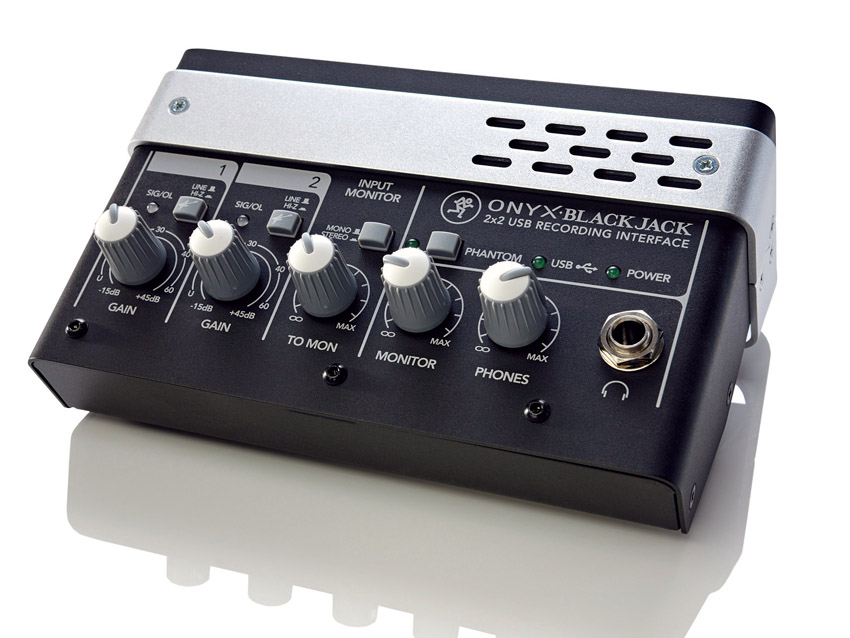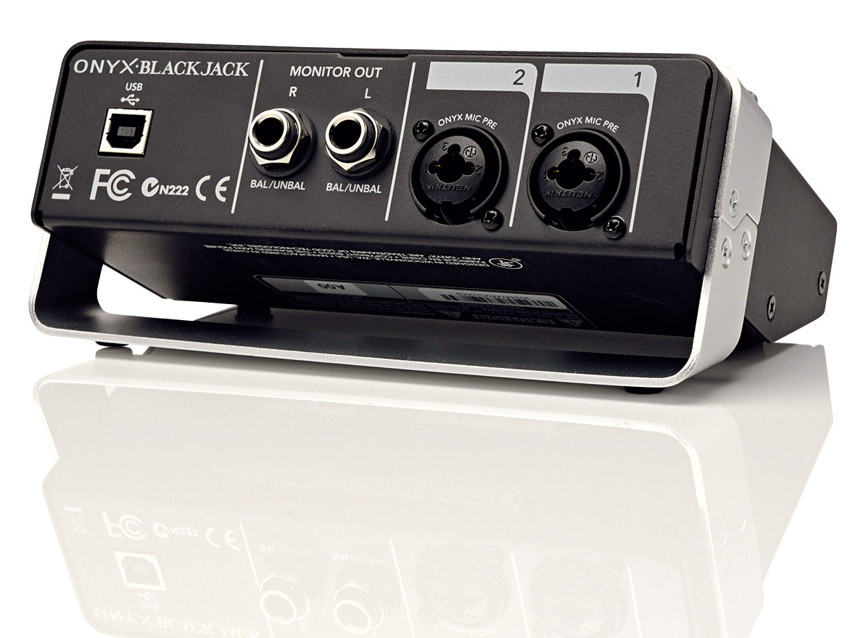MusicRadar Verdict
A rugged bus-powered USB audio interface with great sound quality and versatile monitoring facilities.
Pros
- +
Quality mic preamps. Rugged construction. Latency-free monitoring.
Cons
- -
Not the cheapest option out there.
MusicRadar's got your back

Mackie Onyx Blackjack

Mackie Onyx Blackjack
Mackie's Onyx mic pres have garnered a good reputation among recordists, but it's not everybody that needs or wants to have a full-blown mixer in their recording setup, not to mention any affordability issues.
Not to worry though, if you want to get your hands on some Onyx preamps, Mackie have come up with the Blackjack, a two-channel USB interface built around a pair of the preamps that Mackie say are "designed to meet or surpass expensive, esoteric standalone mic pres in terms of fidelity, headroom and transparency".
Solidly-built with a rugged metal chassis, the Blackjack's control surface sits at a very ergonomic 25 degree angle on your work surface thanks to a chromed metal band that props it up and doubles as a useful carrying handle.
With the exception of the quarter-inch stereo headphone socket on the front panel right where you need it, all the other connections are tucked safely round the back and include a pair of Neutrik combi sockets that can handle input from XLRs and quarter-inch jacks left and right quarter-inch jack monitor outputs and the USB socket.
Signal strength
Being class-compliant, you don't need any special drivers for the Blackjack - it's just a matter of plugging it into a USB socket, setting your DAW's control panel and going for it. The unit is bus-powered so there's no need for a separate power supply, although be aware that it won't operate from an unpowered USB hub.
All signals are catered for, phantom power for condenser mics being globally applied from a front panel switch while the jack component of the combi sockets will handle line level and Hi-Z instrument signals so you can plug guitars and basses straight in - each channel having its own switch for selecting between line and Hi-Z mode.
The gain knob on each channel is linked to an LED that lights green to show a healthy signal and blinks red to show any overload. With separate volume controls for the monitor and phone outputs, it's very easy to set up the monitoring exactly as you need it and there's no need to be concerned about any latency delay as there's an input monitor knob that facilitates zero-latency monitoring by routing the analogue signal directly from the preamps to the monitoring outputs.
Want all the hottest music and gear news, reviews, deals, features and more, direct to your inbox? Sign up here.
You can also switch between stereo and mono monitoring of the input signal so, if you are only using one input channel, you can hear it right up the middle rather than in one ear only.
Onyx mic preamps coupled with Cirrus Logic converters ought to be a recipe for quality sound and the Blackjack doesn't disappoint. There's bags of headroom available and we obtained clean and detailed recordings with both mic and guitar signals.
If you are looking for 96kHz recording you'll need to look elsewhere but if 44.1kHz and 48kHz are your preference, this Mackie has little to fault it.
Hit me
There are plenty of two-by-two audio interfaces on the market, many of them a lot less expensive, but the Blackjack exudes quality. With its brick outhouse construction and USB bus power, it's an ideal portable companion to a laptop but equally at home in a fixed location where it will handle all manner of audio sound sources with aplomb. A great option, covering lots of bases.
Trevor Curwen has played guitar for several decades – he's also mimed it on the UK's Top of the Pops. Much of his working life, though, has been spent behind the mixing desk, during which time he has built up a solid collection of the guitars, amps and pedals needed to cover just about any studio session. He writes pedal reviews for Guitarist and has contributed to Total Guitar, MusicRadar and Future Music among others.
